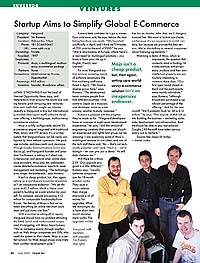Geeks For Sale
Back to Contents of Issue: March 2002
|
|
|
|
by Bruce Rutledge |
|
 THE PRESSURE REALLY started to get to Tim Romero when he decided to cancel Vanguard's office lease at the end of 2001. It was fall, and his potential investors questioned his sanity. "The companies I was negotiating with said, 'What the hell did you do that for?' But I had to," says the founder and president of Vanguard. "Otherwise they'd just stall it out forever. The way I explained it to a couple of people in the company was that I couldn't put a gun to their heads, so I put one to ours." THE PRESSURE REALLY started to get to Tim Romero when he decided to cancel Vanguard's office lease at the end of 2001. It was fall, and his potential investors questioned his sanity. "The companies I was negotiating with said, 'What the hell did you do that for?' But I had to," says the founder and president of Vanguard. "Otherwise they'd just stall it out forever. The way I explained it to a couple of people in the company was that I couldn't put a gun to their heads, so I put one to ours."
The move scared away a couple of potential investors, but Romero says he made the right move. "They would have pulled out eventually anyway," he says. But that didn't relieve the pressure of having to close perhaps the biggest deal of his life in just a few months. On the line were Vanguard's e-commerce engine Mojo, and the jobs of his staff -- he insisted on getting at least a verbal commitment that all or most of his employees would be offered jobs. Romero, a Washington D.C. area native, founded Vanguard in 1997. By the spring of 2000, the company had secured JPY55 million in financing from Broadview and others to bring Mojo to market. Mojo is a fully configurable, secure engine for e-commerce sites that is integrated with traditional Web, FTP and email servers. At the time, Vanguard was a Bit Valley success story, and Romero and staff were full of high hopes. In the July 2000 issue of J@pan Inc (see "Startup Aims to Simplify Global E-Commerce," page 44), Romero was already talking about the next round of financing: "We'll probably look for $8 to $12 million." But then, the Internet roller coaster ride went into one of those precarious dips that leave your stomach in your throat. In fact, that dip just ended for Romero and team at the end of 2001. When that first round of financing came through in 2000, the hope was for sales of 700 Mojo units by the end of that year; the reality is that about 20 companies were using the engine in early 2002. Last April, Romero was faced with a half-finished round of investments, as the company it had retained to secure the financing had pulled out of Japan. He set a deadline for himself: Make something happen by September, or turn to Plan B. Those who were still at the table after Romero canceled his lease were customer-relationship management firm Flying Color, Internet mall operator Rakuten and Digital Garage, a company that develops corporate Internet and e-commerce strategies. But the clock was ticking. All three made offers before the end of 2001 -- Romero declined to discuss financial terms with us -- and Digital Garage was "the best fit," he says. " DG has always been very, very strong in sales, the networking, the sense of the Japanese Internet, but they've been very weak with technology, and we've been the exact opposite." Because of the time limit set by Romero, companies complained they didn't have time for due diligence, and the final deal with Digital Garage turned out to not be an M&A but a purchase of Vanguard's Mojo division, which, Romero admits, was the bulk of the company. Shigeki Saitoh, chief operating officer of Digital Garage, says Mojo is an integral part of the company's sales strategy. "We have developed a new commerce engine for digital content distribution based on Mojo under the name of Smoothy Commerce Server," he says. "This Smoothy series is DG's new strategic direction in our broadband system integration business." Tim Romero, now on the board of Digital Garage, says: "I think you're going to see a lot of M&As and these kinds of deals this year. A lot of companies are running out of cash, and there's some cool stuff out there." @ |
|
Note: The function "email this page" is currently not supported for this page.





